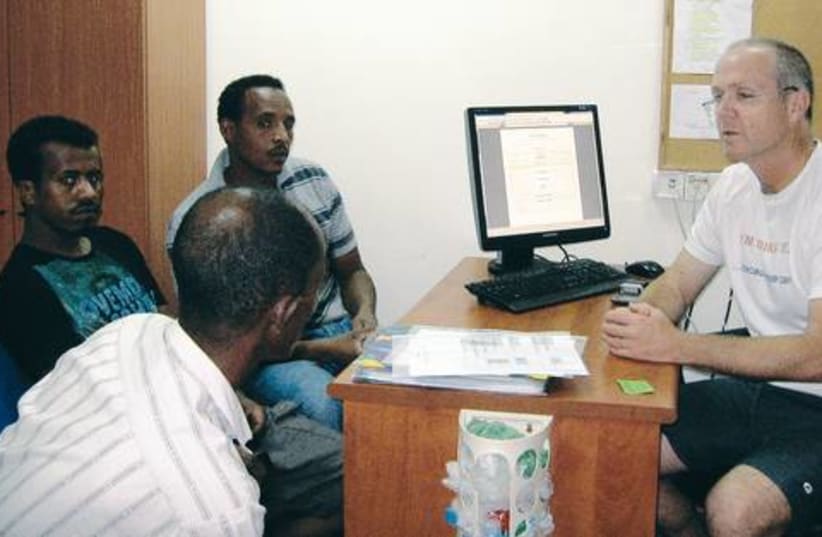Grand declarations are being made these days concerning Israeli government measures to counter the threat posed by waves of infiltrators stealing through Israel’s border with Egypt.
Against the background of reports of more than 2,600 Africans known to have arrived in Israel in November – the highest monthly figure ever recorded – Prime Minister Binyamin Netanyahu has urged his government to adopt policies that include accelerated building of a fence along the desert border with Egypt and concrete plans to significantly augment the number of places in detention facilities intended for unwelcome newcomers. In the works for at least four years, a new version of the antiinfiltration law aims to increase penalties against those entering the country illegally, with potential imprisonment of up to three years in the offing.
The situation on the Israel-Egypt border has actually been dire for at least half a decade, and unsurprisingly, the government is reacting belatedly and inadequately. Though Israel’s sovereignty and security needs justify the government’s attempt to get a hold on the phenomenon of illegal immigration, the announced measures not only display utter misunderstanding of the expectations of Africans lining up to enter Israel as well as the situation of the tens of thousands already here, but also fail to take into consideration Israel’s legal obligations and ethical commitment to those seeking refuge in this land of promise.
The barrier being planned on the Israel- Egypt border may well slow down the flow of Africans crossing the border every month, but it will not suffice to stop the infiltrations altogether. Those Africans who are brave enough to envisage making the difficult trek across the Sinai despite widespread rumors concerning the tremendous risks involved will not be deterred by a fence or by the chance of encountering soldiers on the Israeli side of the border who they have heard will treat them humanely.
Even when not running from individual persecution, the situation in most African countries offers so few options beyond mere survival that the prospect of reaching a democratic, relatively well-run country where even the most menial of labor promises comparatively large returns will continue to draw numerous desperate souls. Once the fence is built, the increased obstacles encountered on the way by those that eventually make it into Israel will only make their vulnerability and their need for humanitarian aid more acute.
Expanding the detention facilities currently being managed by Israel’s prison services will similarly not provide the sought-for answers to the plight of illegal migrants from Africa. The facilities being built will hold a maximum of 15,000 detainees – less than one third of those believed to already be in the country. This perspective effectively prevents the planned ban on employment of illegal African infiltrators from being implemented, unless the government comes up with effective assistance schemes for those not interned in government-run compounds.
Beyond, though refugees dream of making it to the “big city” to try their luck at making money, the option of being stuck for months or even years in remote locations where decent treatment and basic services are offered free of charge will be considered a less fortunate option, not a radical deterrent.
As for the revised version of the antiinfiltration law, though it is decried by Israeli human-rights advocates for its infringement on the alleged freedom of movement of illegal migrants, it won’t necessarily worsen the treatment of infiltrators significantly.
Those deemed to be refugees or deserving of group protection rather than illegal migrant workers are likely not to fall under the new law’s jurisdiction. As such, the law will essentially not apply to Eritreans and Sudanese who constitute the overwhelming majority of those seeking refuge and whom Israel has – for now, according to unofficial policy – decided not to deport back to their countries of origin even when it fails to grant them full-fledged refugee status.
Yet beyond failing to provide allencompassing solutions against the influx of African asylum seekers, the measures currently on the table fall short of what can legitimately be expected from Israel as a democratic and Jewish state. The government’s legitimate duty to enact policies that ensure the country’s security needs and attempt to limit the possibility of a large foreign population setting down roots in the country cannot come in place of Israel’s commitments to the UN Refugee Convention and to the very idea of being a country of refuge for the oppressed.
Thus far, government measures to deal with refugees have proven to be lacking in vision or sensitivity, often merely reactive and shortsighted. Authorities have utterly failed to think globally about immigration policy in ways that that might, for example, warrant giving priority status to asylum seekers over new legally imported foreign laborers. Current internal policy seeks to deter those waiting in Egypt to come to Israel by making the lives of those already here ever more difficult. Furthermore government officials constantly label African migrants arriving in Israel “infiltrators” yet simultaneously refuse to determine whether these asylum seekers are, in fact, refugees who have legitimate fears of being deported back to their countries of origin.
In this manner, the Israeli government is allowing for suspicion and resentment of alien migrants to grow all the while denying Israeli citizens the opportunity to recognize that – beyond the challenges posed by the current wave of Africans seeking refuge in the country – “in every generation, one is obligated to see oneself as one who personally came out from Egypt.”
The writer is a lawyer for non-profits, formerly part of the protection team at UNHCR’s Israel office and currently a member of the board of directors of ASSAF – Aid Organization for Refugees & Asylumseekers in Israel.
